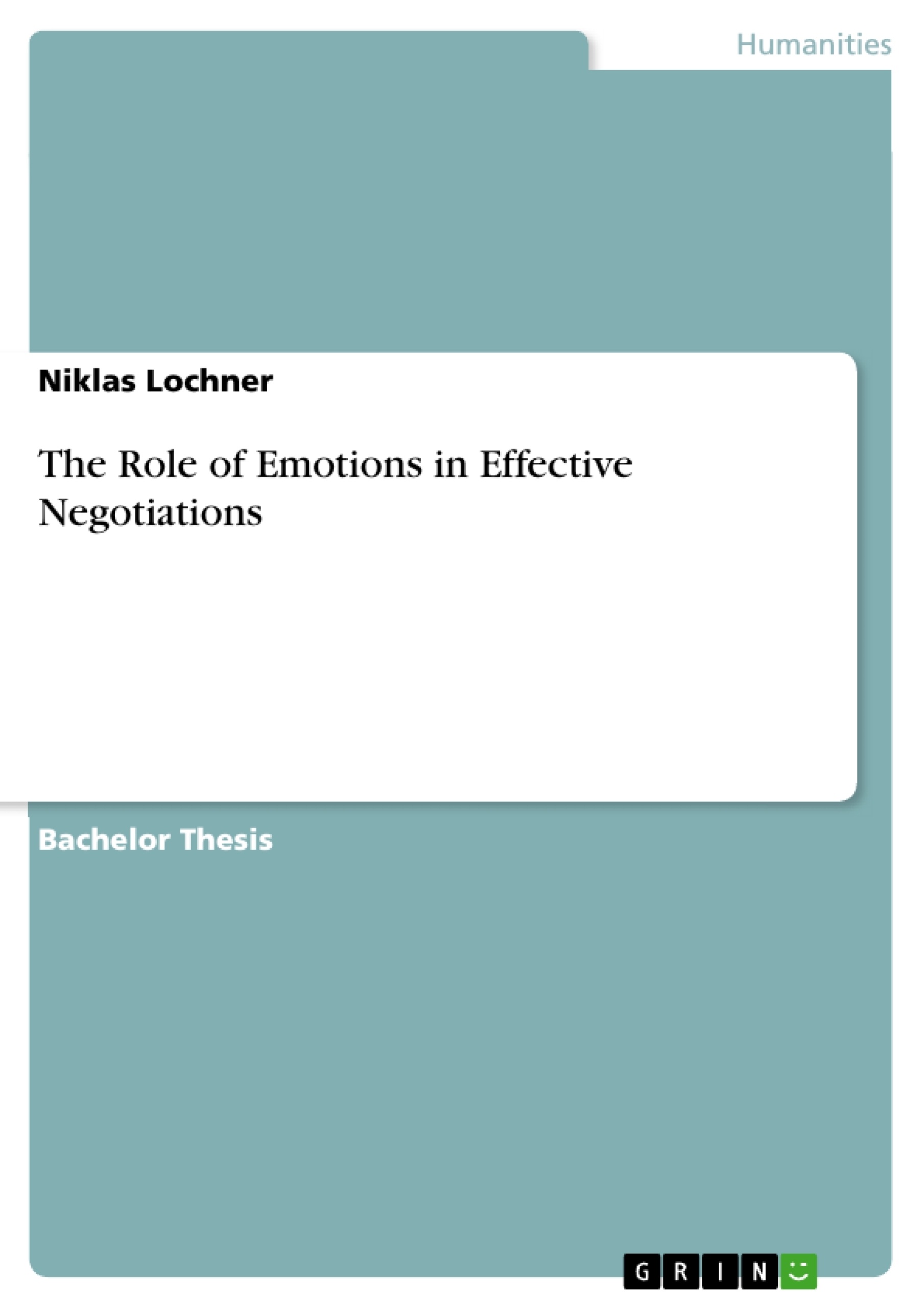Whether people are bargaining for the price of a flower at the florist's around the corner, a teenager is negotiating about the time he has to be home at night or the German Bayer AG is negotiating a $66bn takeover deal with Monsanto, negotiations happen every day for different reasons.
Even though we are negotiating every day, there is still a misunderstanding about negotiations that often jeopardizes the outcome of the negotiation. Most people think that negotiating is a sequence of rational decision processes whereas, as a matter of fact, negotiating involves a dimension that is most often underestimated or ignored: emotions. These might be positive emotions like happiness or negative emotions like disappointment and guilt, but what they all have in common is that they significantly impact negotiations.
This lack of awareness about the influence of emotions on negotiations often leads to negotiation strategies that ignore emotions, even though, recognizing and using emotions can significantly improve the negotiation experience and results. Based on the assumption that emotions do influence negotiations, this thesis focuses on the question how different emotions influence the negotiation and which skills and knowledge are necessary in order to improve negotiations through emotional intelligence.
Inhaltsverzeichnis (Table of Contents)
- INTRODUCTION
- Aim and Structure of the paper
- INTRODUCTION TO NEGOTIATIONS
- Conflicts - The Cause of Negotiations
- Definition of Negotiation
- Distributive and Integrative Negotiations
- Types of Negotiators
- Hard Bargainers
- Soft Bargainers
- Principled Bargainers - The Harvard Concept
- EMOTIONS
- The Challenge of Defining Emotions
- The Origin of Emotions
- The Appraisal Theory
- Limbic System - The Neuroscience of the Appraisal Theory
- Functions of Emotions
- Motivation
- Communication
- Decision Making
- PERCEIVING EMOTIONS
- The Concept of Emotional Intelligence
- Recognition of Emotions Through Non-Verbal Communication
- The Six Basic Emotions
- Macro Expressions
- Surprise
- Fear
- Happiness and Enjoyment
- Disgust
- Sadness
- Anger
- Subtle Expressions
- Micro Expressions
- UNDERSTANDING EMOTIONS IN THE CONTEXT OF A NEGOTIATION
- Deception and Lies
- Masking Deceit
- The Three Meta-Emotions of a Lie
- Detection Apprehension
- Deception Guilt
- Duping Delight
- Different Personalities Require Different Negotiation Approaches
- The Big Five Personality Traits
- Machiavellianism
- The Influence of Personality on the Negotiation Strategy
- STRATEGIC USE OF EMOTIONS IN NEGOTIATIONS
- The Difference Between Positive and Negative Emotions
- The Classification of Emotional Negotiation Strategies and Tactics
- Strategies to Diminish Negative and Stimulate Positive Emotions
- Emotional Negotiation Preparation
- Mirroring
- Showing Tactical Empathy
- Taking a Break
- Changing the Players or the Place
Zielsetzung und Themenschwerpunkte (Objectives and Key Themes)
This paper explores the role of emotions in effective negotiations. It aims to provide an understanding of how emotions influence negotiation dynamics and how they can be strategically utilized for successful outcomes.
- The influence of emotions on negotiation behavior
- The importance of emotional intelligence in negotiations
- The strategic use of emotions to achieve negotiation goals
- The impact of personality traits on emotional negotiation strategies
- The role of nonverbal communication in detecting and interpreting emotions during negotiations
Zusammenfassung der Kapitel (Chapter Summaries)
The first chapter introduces the paper's aim and structure. Chapter two provides a general overview of negotiations, including conflict resolution, negotiation definitions, and different negotiation styles. Chapter three delves into the concept of emotions, exploring their definition, origin, and functions. Chapter four focuses on perceiving emotions, specifically the concept of emotional intelligence and recognizing emotions through nonverbal communication. Chapter five examines the role of emotions in the context of a negotiation, discussing deception, lies, and the influence of personality traits on negotiation approaches. Chapter six explores the strategic use of emotions in negotiations, highlighting the difference between positive and negative emotions and outlining emotional negotiation strategies and tactics.
Schlüsselwörter (Keywords)
The main keywords of the paper are emotions, negotiation, emotional intelligence, nonverbal communication, deception, personality traits, and strategic negotiation.
Frequently Asked Questions
How do emotions impact the outcome of a negotiation?
Emotions significantly influence decision-making, motivation, and communication. Ignoring them can jeopardize results, while managing them can improve the experience and outcome.
What is the difference between distributive and integrative negotiations?
Distributive negotiation focuses on dividing a fixed resource (win-lose), while integrative negotiation seeks to create value and find mutually beneficial solutions (win-win).
What role does emotional intelligence play in bargaining?
Emotional intelligence allows negotiators to recognize their own emotions and those of others, enabling them to respond strategically and build empathy.
How can micro-expressions help in detecting deception?
Micro-expressions are fleeting, involuntary facial expressions that reveal true emotions, which can be crucial for identifying lies or hidden feelings during a deal.
What is "tactical empathy" in negotiations?
Tactical empathy is a strategic approach where a negotiator acknowledges the other party's perspective and emotions to build trust and influence the discussion.
- Arbeit zitieren
- Niklas Lochner (Autor:in), 2016, The Role of Emotions in Effective Negotiations, München, GRIN Verlag, https://www.grin.com/document/354941



